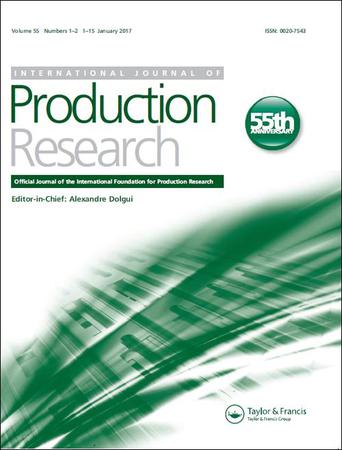具有序列依赖和资源约束设置的不相关机器的加权延迟最小化
IF 7.3
2区 工程技术
Q1 ENGINEERING, INDUSTRIAL
International Journal of Production Research
Pub Date : 2023-11-01
DOI:10.1080/00207543.2023.2275634
引用次数: 0
摘要
摘要以快速作业(再)调度需求为出发点,研究了以总加权延迟最小化为目标的精细调度环境。所研究的问题变体远远超出了现有的文献,因为它考虑了不相关的机器、序列相关和机器相关的设置时间,以及对同时设置数量的可再生资源约束。对于这种变体,我们提供了一个宽松的MILP来计算下界,从而估计最坏情况下的最优性差距。由于快速精确的方法对于实际重要性的实例似乎不合理,我们扩展了已知的(元)启发式来处理手头的问题,将它们与约束规划(CP)组件相结合-这对于保证不违反问题的约束至关重要-这对于延迟最小化而言是最优分配资源的。我们广泛的实验研究揭示了采用不同(元)启发式方法利用宽松的MILP作为质量度量的有效性和通用性,这表明所部署的方法根据实例参数具有互补的优势。由于问题描述是从纺织制造商那里获得的,其中不同规模的工作在紧迫的截止日期下不断到达,我们还讨论了我们的方法在延迟减少和更广泛的管理见解方面的实际影响。关键词:并行机调度顺序相关设置时间加权延迟元启发式纺织品制造披露声明作者未报告潜在的利益冲突。数据可用性声明支持这项工作发现的实例、结果和代码可在https://github.com/svatikiot/Weighted_Tardiness_Experiments.Additional上获得。资助本研究由欧盟通过FACTLOG Horizon 2020项目提供支持,资助号为869951。作者简介sioannis Avgerinos是希腊雅典经济与商业大学管理科学与技术系组合优化专业的博士生。他持有雅典国立技术大学(National Technical University of Athens)的信息工程学士学位和雅典经济与商业大学(Athens University of Economics and Business)的管理科学与技术硕士学位。他的研究兴趣包括组合优化、分解方法及其在运输和生产调度问题上的应用。本文作者是雅典经济与商业大学管理科学与技术系教授。他在帕特雷大学学习计算机工程和信息学,在伦敦政治经济学院学习运筹学。他的学术兴趣集中在组合优化、多面体组合和整数规划与约束规划的集成。他的工作已被应用于制造业和物流的优化问题,并得到了几个欧盟资助项目的支持。Stavros Vatikiotis,雅典经济与商业大学管理科学与技术系博士候选人。他在雅典国立技术大学学习电气和计算机工程,并拥有雅典国立技术大学应用数学和物理科学学院的数学建模硕士学位。主要研究方向为组合优化方法的设计及其在工业生产环境中的应用。Georgios Zois是雅典经济与商业大学管理科学与技术系的研究助理。他在约阿尼纳大学学习计算机科学,在雅典大学学习逻辑、算法和计算,并在皮埃尔和玛丽居里大学(UPMC)获得博士学位,研究能源和温度效率计算的算法问题。他的研究兴趣在于为物流和制造业领域的实际应用设计和分析高效精确和接近最优的优化算法,包括位置优化和多式联运问题,以及资源意识生产调度和计划。本文章由计算机程序翻译,如有差异,请以英文原文为准。
Weighted tardiness minimisation for unrelated machines with sequence-dependent and resource-constrained setups
AbstractMotivated by the need of quick job (re-)scheduling, we examine an elaborate scheduling environment under the objective of total weighted tardiness minimisation. The examined problem variant moves well beyond existing literature, as it considers unrelated machines, sequence-dependent and machine-dependent setup times, and a renewable resource constraint on the number of simultaneous setups. For this variant, we provide a relaxed MILP to calculate lower bounds, thus estimating a worst-case optimality gap. As a fast exact approach appears not plausible for instances of practical importance, we extend known (meta-)heuristics to deal with the problem at hand, coupling them with a Constraint Programming (CP) component – vital to guarantee the non-violation of the problem's constraints – which optimally allocates resources with respect to tardiness minimisation. The validity and versatility of employing different (meta-)heuristics exploiting a relaxed MILP as a quality measure are revealed by our extensive experimental study, which shows that the methods deployed have complementary strengths depending on the instance parameters. Since the problem description has been obtained from a textile manufacturer where jobs of diverse size arrive continuously under tight due dates, we also discuss the practical impact of our approach in terms of both tardiness decrease and broader managerial insights.KEYWORDS: Parallel machine schedulingsequence-dependent setup timesweighted tardinessmetaheuristicstextile manufacturing Disclosure statementNo potential conflict of interest was reported by the author(s).Data availability statementInstances, results and codes that support the findings of this work are available at https://github.com/svatikiot/Weighted_Tardiness_Experiments.Additional informationFundingThis research has been supported by the EU through the FACTLOG Horizon 2020 project, grant number 869951.Notes on contributorsIoannis AvgerinosIoannis Avgerinos is a Ph.D. candidate in combinatorial optimization at the Department of Management Science and Technology, Athens University of Economics and Business, Greece. He received the Bachelor's degree in geomatics engineering from National Technical University of Athens and the Master's degree in management science and technology from Athens University of Economics and Business. His research interests include combinatorial optimisation, decomposition methods and their implementation on transport and production scheduling problems.Ioannis MourtosIoannis Mourtos is a professor at the Department of Management Science and Technology, Athens University of Economics and Business. He studied computer engineering and informatics at University of Patras and operations research at London School of Economics and Political Science. His academic interests lie within combinatorial optimisation, polyhedral combinatorics and the integration of integer programming with constraint programming. His work has been applied to optimisation problems in manufacturing and logistics and has been supported by several EU-funded projects.Stavros VatikiotisStavros Vatikiotis is a Ph.D. candidate at the Department of Management Science and Technology, Athens University of Economics and Business. He studied electrical and computer engineering at National Technical University of Athens and holds a Master's degree in mathematical modeling from the School of Applied Mathematical and Physics Sciences, National Technical University of Athens. His research interests lie in the design of combinatorial optimisation methods and their applications on industrial production environments.Georgios ZoisGeorgios Zois is a research associate at the Department of Management Science and Technology, Athens University of Economics and Business. He studied computer science at University of Ioannina, logic, algorithms and computation at University of Athens and received his Ph.D. from University Pierre and Marie Curie (UPMC) on algorithmic problems for energy and temperature-efficient computing. His research interests lie in the design and analysis of efficient exact and near-optimal optimisation algorithms for real-life applications in the areas of logistics and manufacturing, including location optimisation and multimodal transportation problems, as well as resource-aware production scheduling and planning.
求助全文
通过发布文献求助,成功后即可免费获取论文全文。
去求助
来源期刊

International Journal of Production Research
管理科学-工程:工业
CiteScore
19.20
自引率
14.10%
发文量
318
审稿时长
6.3 months
期刊介绍:
The International Journal of Production Research (IJPR), published since 1961, is a well-established, highly successful and leading journal reporting manufacturing, production and operations management research.
IJPR is published 24 times a year and includes papers on innovation management, design of products, manufacturing processes, production and logistics systems. Production economics, the essential behaviour of production resources and systems as well as the complex decision problems that arise in design, management and control of production and logistics systems are considered.
IJPR is a journal for researchers and professors in mechanical engineering, industrial and systems engineering, operations research and management science, and business. It is also an informative reference for industrial managers looking to improve the efficiency and effectiveness of their production systems.
 求助内容:
求助内容: 应助结果提醒方式:
应助结果提醒方式:


